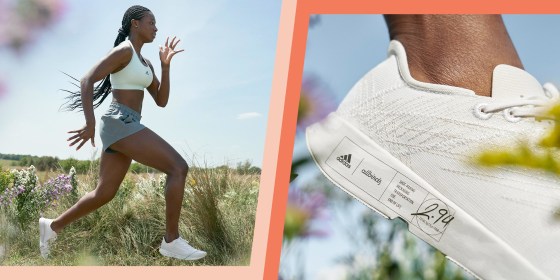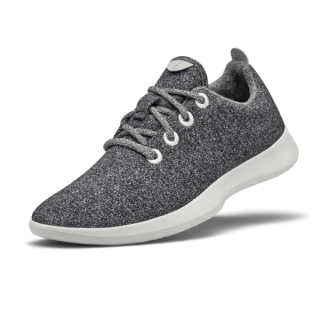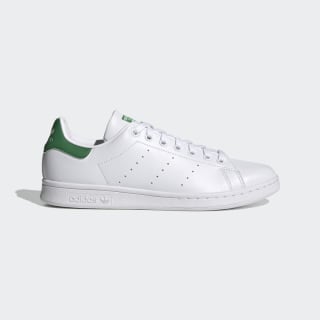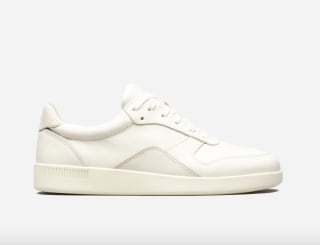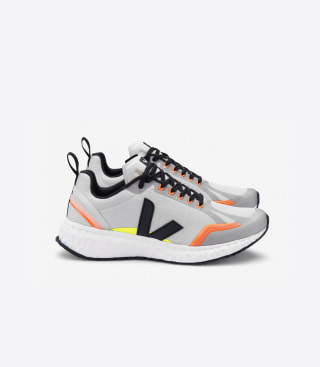Last May, sportswear companies Adidas and Allbirds announced a partnership focused on a sustainable future for performance footwear — today, they unveiled the first product from the collaboration: the FUTURECRAFT.FOOTPRINT, a running shoe with a carbon footprint of less than 3 kilograms of carbon dioxide equivalent emissions (CO2e) per pair.
That number is a personal best for both brands and a considerable achievement: The average running shoe generates about 12.5 kilograms of carbon dioxide emissions, as calculated by Allbirds — a 2013 MIT study found that a "typical pair of running shoes" generates "30 pounds of carbon dioxide emissions," which translates to 13.6 kilograms.
The shoe is part of the partnership's 12-month goal of reimagining manufacturing and supply chain processes to create a product with a carbon impact that is as close to zero as possible. When compared to Adidas’ Adizero RC3 running shoe that features similar performance, the FUTURECRAFT.FOOTPRINT manufacturing resulted in 63 percent less carbon emissions, the duo claimed. The lightweight, sustainable design of the shoe features a new upper material made with 70 percent recycled polyester and 30 percent natural Tencel, which is made from wood pulp. While the FUTURECRAFT.FOOTPRINT isn’t yet widely available, an initial launch will raffle 100 pairs to Adidas Creators Club members. A 2021 release later this year will be make available 10,000 pairs, and a wider release will come in 2022.
“By truly co-creating and providing each other with open access to knowledge and resources — such as Allbirds’ knowledge of carbon calculation and experience with natural materials, and Adidas’ capabilities in manufacturing and performance footwear — this is a call to action for other brands, and a milestone in the sports industry achieving carbon neutrality,” said Brian Grevy, executive board member of global brands at Adidas.
Both brands have had a major role in sustainability over the years. Allbirds says it uses recycled and natural materials like wool, tree fiber and sugarcane to reduce its carbon impact. The brand has also committed to becoming carbon-neutral, meaning that for every ton of carbon the company emits, they will pay to “take” a ton of carbon out of the atmosphere by purchasing credits from third-party emission reduction products, known as “carbon offsets."
Adidas’ road to sustainability reached a major milestone in 2020: That year, the brand said that more than half of the polyester used in its products came from recycled plastic waste. By 2024, the brand aims to only use recycled polyester in its collections. Adidas also committed to reducing both its own and its suppliers’ greenhouse gas emissions by 30 percent by 2030 and to achieve climate neutrality by 2050. Since 2015, Adidas has collaborated with environmental organization Parley for the Oceans and has hosted products made with plastic waste from beaches and coastal regions.
The FUTURECRAFT.FOOTPRINT forms part of Adidas’ FUTURECRAFT line, which incorporates new innovations and technologies to shape the future of sportswear. Other FUTURECRAFT projects include the FUTURECRAFT.STRUNG that combines 3D printing with robotic automation, and the fully recyclable FUTURECRAFT.LOOP initiative.
Sustainable footwear available now
Allbirds Wool Runners
This popular shoe is made with wool from Merino sheep, as well as other materials like recycled bottles, castor bean oil and recycled cardboard, according to the brand. The Wool Runners are machine washable and include a sugarcane midsole and shoelaces made from 100 percent post-consumer recycled polyester. Allbirds claims that its production uses 60 percent less energy than synthetic shoes due to the use of wool. They’re also certified by the Forest Stewardship Council, an independent nonprofit that rates products for sustainability.
Adidas Stan Smith Shoes
The Stan Smith shoes are one of Adidas’ most iconic designs — and the brand recently redesigned them as part of its commitment to use only recycled polyester by 2024. Still sporting the same silhouette, the shoes are now made with PRIMEGREEN, a series of high-performance recycled materials that includes no virgin polyester. The brand is also working on testing the Stan Smith Mylo, the first shoe made using a new mushroom-based material that looks and feels like leather.
Tread by Everlane
Everlane is best known for its simple, minimalistic look, and its sneakers live up to that reputation. The Tread Trainers are created using conventional sneaker materials that are either recycled or come from a sustainable source, according to the brand. The Tread’s sole is almost entirely free of plastic (it uses recycled rubber instead) and the laces and linings are made of recycled plastic bottles. The shoe’s leather is sourced from a tannery that’s certified gold by the Leather Working Group, which maintains environmental protocols for leather. In terms of Everlane’s carbon footprint, it’s 100 percent offset in partnership with NativeEnergy, according to the brand.
Veja Condor Sneakers
Veja’s running shoe, the Condor, comes in multiple colorful designs and is made with recycled plastic and natural materials like rubber, sugarcane and rice waste, according to the brand. The upper is made from 100 percent recycled plastic bottles and the jersey lining is made from 100 percent recycled polyester. According to its website, Veja’s rubber soles are made from responsibly-run forests in Brazil.
Catch up on Select's in-depth coverage of personal finance, tech and tools, wellness and more, and follow us on Facebook, Instagram and Twitter to stay up to date.

